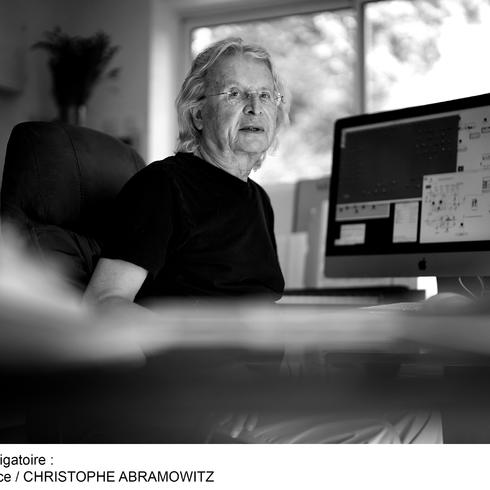Ed. Henri Lemoine
WORLD PREMIERE
May 4th, 2012 - Festival Musica Viva, Munich, Germany - Pierre-Laurent Aimard, piano - Symphonieorchester of Bayerischen Rundfunks - dir. George Benjamin.
Sponsor: Musica Viva, New York Philharmonic, Royal Concertgebouw
Orchestrated, Seoul Philharmonic Orchestra.
NOTES
No notes from the composer but an article of Bertrand Bolognesi (Anaclase)
“(…) this new work (…) continues the spectral adventure in the benefit of the increasingly fine contribution of the computer programs exploited by the French composer.
By its title, “Le désenchantement du monde “refers to the German sociologist Max Weber who considered the advent of a definitely scientific era, in the continuation of the Age of Enlightenment, like the access to a world without magic, with the help of the induced trauma: the concept of “rational prosaicness” could attack the feeling of freedom and human responsibility. With the subtitle, symphonic Concerto for piano and orchestra, this page pays tribute to Ferenc Liszt whose were selected the Sonata in so minor S.178 (1853) and the Concerto in major the n°2 S.125 (1861) for formal models (several parts treated of only one feature which mixes them).
The Orchestral manpower is spreading little by little like the multiplication of the piano resounding possibilities, in a progressive amplification of the solistic writing “en escalier”. The more rhythmic section makes taste shininesses which rebound on textures subtly moire where the tones are discreetly declined by the particular colour of the micro-intervals. The play soon advances towards a frankly massive breaking where the pianistic pattern, although relayed in delicacy by the harp, fossilize in an authoritative power. In this interlacing of rationality and imagination, it is undoubtedly the artistic “fantasy” which has the last word: after a kind of thundering false-final, the disenchantment of the world is concluded in an unexpected calm which looks far away.
This creation was introduced by the “Venetian Games” written by Witold Lutos?awski in 1961, at the request of the Chamber orchestra of Cracow and the Venice Biennale.
With this opus, the Polish musician continued an approach of the random, almost “open work”. In margin of the influence of Bartók (which, though characterized, would show soon his limits) and of the Schönberg theory (which he will find finally too constraining), the Polish composer sealed with ”Venetian Games” his fascination for the piano Concerto of John Cage, who appeared ideal of freedom to him, and for the uncertainty usual to the American.
From the first movement, the impression of cluster of not-measured cords, alternating with very precise flat, is seizing. After a conclusion in the scansion extremely impacted by the percussions, the following movement, quasi scherzo, advance in the infinitely small dodecaphonic with a savour that Peter Eötvös reveals closer to Berg than Schönberg, until in its conclusive aphorism by the wind instruments. Undoubtedly, the public is grabbed by this refined interpretation, as testifies the extreme concentration which in an invaluable silence lets breathe the sequences. Thus the melismatic recitative flute, whose certain aspects announce Aperghis, saunters it in all serenity, before the fourth and ultimate play vigorously clash the preceding elements, at all the stations, often apart from the path. At the return of the percussion part largely stressed then it melts itself in the obstinacy of the piano and the chirp of the harp, suddenly definitively stopped. (…) ”
Source: Anaclase website, article written by Bertrand Bolognesi following the concert “Tristan Murail | Le désenchantement du monde”
Pierre-Laurent Aimard, Peter Eötvös, Koninklijk Concertgebouworkest” Concertgebouw, Amsterdam - September 14th, 2012.


